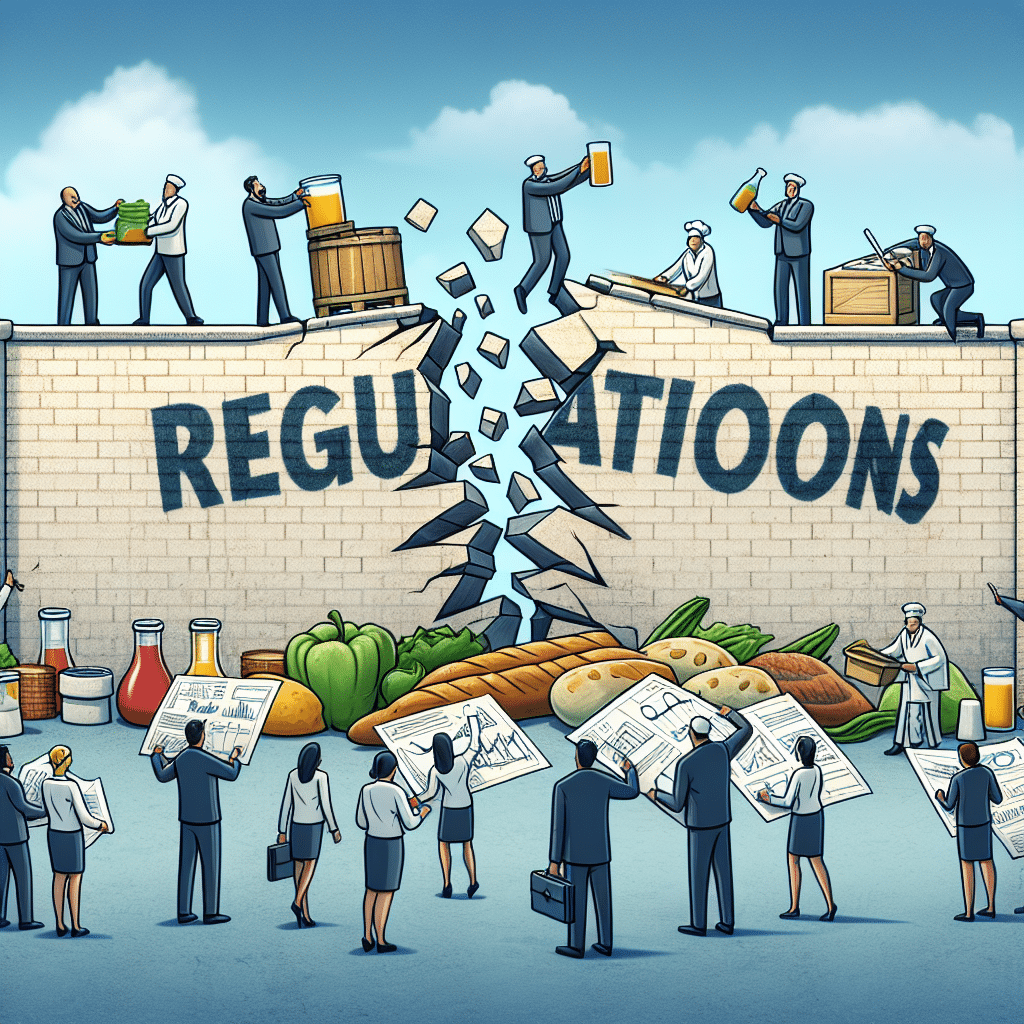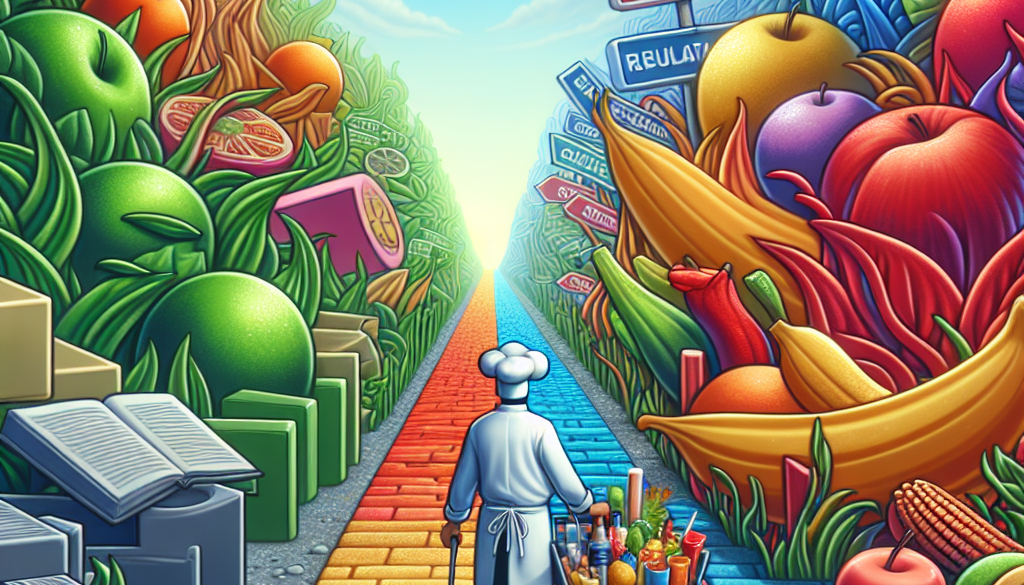Regulatory Puts the “No” in Food and Beverage Innovation? Not Anymore
-
Table of Contents
- Food and Beverage Innovation Thrives Despite Regulatory Challenges
- Understanding the Regulatory Landscape
- Regulatory Hurdles and Innovation
- Collaboration Leads to Progress
- Case Studies of Successful Innovation
- Statistics That Show a Changing Tide
- Conclusion: A Future of Innovation and Safety
- ETprotein: Pioneering Protein Products for the Future
Food and Beverage Innovation Thrives Despite Regulatory Challenges

The food and beverage industry is a dynamic and ever-evolving landscape, where innovation is the key to staying competitive. However, regulatory frameworks have often been viewed as a barrier to creativity and progress within the industry. The perception that regulatory bodies say “no” to innovation is not entirely unfounded, as safety and public health concerns are paramount. Yet, recent trends suggest that the relationship between regulation and innovation is becoming more symbiotic, allowing for groundbreaking advancements while ensuring consumer safety. This article explores how the industry is navigating regulatory challenges to bring new and exciting products to market.
Understanding the Regulatory Landscape
Before delving into the successes, it’s crucial to understand the role of regulatory bodies in the food and beverage industry. Agencies like the U.S. Food and Drug Administration (FDA), the European Food Safety Authority (EFSA), and others worldwide are tasked with protecting public health by ensuring the safety and efficacy of food products. Their regulations cover a broad spectrum, from ingredient safety and labeling to manufacturing processes and marketing claims.
Regulatory Hurdles and Innovation
Historically, the stringent requirements set forth by these agencies have been seen as hurdles to innovation. The approval process for new ingredients can be lengthy and expensive, discouraging companies from investing in novel products. Additionally, the complexity of global markets, each with its own regulatory standards, can make it challenging for companies to launch products internationally.
Collaboration Leads to Progress
Despite these challenges, the narrative is changing. Regulatory bodies are increasingly collaborating with industry players to facilitate innovation while maintaining safety standards. Here are some ways in which this is happening:
- Pre-Market Consultations: Many regulatory agencies now offer pre-market consultations to help companies understand the requirements for new product approvals, reducing the risk of costly delays.
- Public-Private Partnerships: Joint initiatives between the public and private sectors are fostering research and development in areas like nutrition, sustainability, and food safety.
- Streamlined Processes: Efforts to streamline regulatory processes are reducing the time and cost associated with bringing new products to market.
Case Studies of Successful Innovation
Several case studies highlight how companies have successfully navigated the regulatory landscape to bring innovative products to consumers:
- Plant-Based Alternatives: The rise of plant-based meats and dairy alternatives has been meteoric, with companies working closely with regulators to ensure these new products meet safety and labeling standards.
- Functional Beverages: The functional beverage sector has seen a surge in products with health benefits beyond basic nutrition. Regulatory approval for health claims has been crucial for this market segment’s growth.
- Cultured Meat: Companies developing lab-grown meat are engaging with regulators early in the process to address safety and labeling concerns, paving the way for future approvals.
Statistics That Show a Changing Tide
Recent statistics reflect the positive impact of regulatory collaboration on innovation:
- Investment in food tech startups has increased significantly, with billions of dollars flowing into the sector annually.
- The number of new food and beverage product launches continues to grow, with a notable increase in health-oriented and sustainable products.
- Regulatory approvals for novel ingredients and food technologies are on the rise, indicating a more receptive stance towards innovation.
Conclusion: A Future of Innovation and Safety
The food and beverage industry is proving that innovation can flourish within the confines of regulatory frameworks. By working collaboratively with regulatory bodies, companies are finding ways to navigate the complexities of approval processes and bring groundbreaking products to market. The result is a win-win situation where consumer safety is upheld, and the industry continues to evolve and grow.
ETprotein: Pioneering Protein Products for the Future
In line with the innovative spirit of the food and beverage industry, ETprotein is at the forefront of providing high-quality protein products that meet the demands of modern consumers. Their range of organic bulk vegan proteins and L-(+)-Ergothioneine (EGT) caters to various industries, including nutraceuticals, pharmaceuticals, and food and beverage.
ETprotein’s commitment to non-GMO, allergen-free, and high-purity products ensures that they not only comply with regulatory standards but also exceed consumer expectations. Whether you’re looking for plant-based protein options or specialized ingredients like L-(+)-Ergothioneine, ETprotein offers innovative solutions that align with the industry’s forward-thinking approach.
About ETprotein:
ETprotein, a reputable protein and L-(+)-Ergothioneine (EGT) Chinese factory manufacturer and supplier, is renowned for producing, stocking, exporting, and delivering the highest quality organic bulk vegan proteins and L-(+)-Ergothioneine. They include Organic rice protein, clear rice protein, pea protein, clear pea protein, watermelon seed protein, pumpkin seed protein, sunflower seed protein, mung bean protein, peanut protein, and L-(+)-Ergothioneine EGT Pharmaceutical grade, L-(+)-Ergothioneine EGT food grade, L-(+)-Ergothioneine EGT cosmetic grade, L-(+)-Ergothioneine EGT reference grade and L-(+)-Ergothioneine EGT standard. Their offerings, characterized by a neutral taste, non-GMO, allergen-free attributes, with L-(+)-Ergothioneine purity over 98%, 99%, cater to a diverse range of industries. They serve nutraceutical, pharmaceutical, cosmeceutical, veterinary, as well as food and beverage finished product distributors, traders, and manufacturers across Europe, USA, Canada, Australia, Thailand, Japan, Korea, Brazil, and Chile, among others.
ETprotein specialization includes exporting and delivering tailor-made protein powder and finished nutritional supplements. Their extensive product range covers sectors like Food and Beverage, Sports Nutrition, Weight Management, Dietary Supplements, Health and Wellness Products, and Infant Formula, ensuring comprehensive solutions to meet all your protein needs.
As a trusted company by leading global food and beverage brands and Fortune 500 companies, ETprotein reinforces China’s reputation in the global arena. For more information or to sample their products, please contact them and email sales(at)ETprotein.com today.












